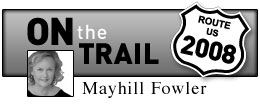
On the first morning of this year's PDF, Micah Sifry, editor of the Personal Democracy Forum and co-founder of TechPresident.com, said, "I'm a big believer in the wisdom of crowds." By the end of the second day at this largely but not exclusively liberal/progressive conference, a confidence in crowds had been challenged. This dialectic shapes not only a larger debate, the kind that occurs at conferences, but also the current presidential race. Tuesday's arc was illustrative. In the morning the digital ethnologist Mark Pesce gave a bracing corrective to crowd wisdom. Speaking from a sociological and philosophical perspective, Pesce talked about the hyper connectivity that the internet provides. We are being asked to believe this will help political campaigns, he said. We are asked to believe things and politics will be different. "Bullshit." Under an iconic image of Barack Obama, Pesce's PowerPoint presentation showed YES WE CAN HAS. In other words, the fact that Barack Obama now has over a million friends on Facebook (mentioned frequently at PDF) may not be such a happy portent.
 At the closing plenary session, Gina Cooper, executive director of Netroots Nation, seemed to embody Pesce's fears. In talking about "the government of everybody," Cooper asserted that Barack Obama has made "a promise that cannot be reneged on at this point." She went on to say, "I don't think they're [an Obama Administration] gonna have a choice." Cooper's sure tone was in and of itself a dramatic enactment of Pesce's further point about hyper connectivity, that it begets hyper mimesis, which in turn begets hyper empowerment. From Pesce's point of view, Cooper is hyper empowered. We've had some "lovely sentiments" from Senator Obama about grassroots organization, Pesce said in the morning. "But his hyper connected will do as it pleases." After Cooper's remarks in the afternoon, Pesce twittered on the big twitter board above the stage, "People having a voice in trade policy. Quelle horror."
At the closing plenary session, Gina Cooper, executive director of Netroots Nation, seemed to embody Pesce's fears. In talking about "the government of everybody," Cooper asserted that Barack Obama has made "a promise that cannot be reneged on at this point." She went on to say, "I don't think they're [an Obama Administration] gonna have a choice." Cooper's sure tone was in and of itself a dramatic enactment of Pesce's further point about hyper connectivity, that it begets hyper mimesis, which in turn begets hyper empowerment. From Pesce's point of view, Cooper is hyper empowered. We've had some "lovely sentiments" from Senator Obama about grassroots organization, Pesce said in the morning. "But his hyper connected will do as it pleases." After Cooper's remarks in the afternoon, Pesce twittered on the big twitter board above the stage, "People having a voice in trade policy. Quelle horror."
I would like to say that Mark Pesce was the best speaker at PDF because he challenged much PDF conventional wisdom--which of course he did. But in the end I was struck by him, in that typically human way, because he confirmed some of my own thinking even though I place Gina Cooper in a different perspective. I come not from thinking about and observing social media but from watching the Obama Campaign unfold. From the ground, I see two big problems with Cooper's assertion. First of all, the progressives are not Barack Obama's only constituency -- even now, when he is just a candidate. Older African-Americans, younger Hispanics, Midwestern farmers, Reagan Democrats, Independents and Obamacans don't all want the same "government of everybody." More importantly, Gina Cooper has made a fundamental misapprehension of Barack Obama if she believes that he is going to allow people to "demand" certain things of him. But the hopes of progressives have been raised. Furthermore, Obamamania itself is an inchoate force that has been let out of the bottle and cannot be re-stoppered. For quite awhile now, I have thought that the netroots affair with Obama would not end well. Cooper's beliefs only confirm my foreboding.
There was a lot of Obama at PDF just as a backdrop to general conversation. Because so many of the participants and speakers were liberals, the talk was largely buoyant. But there was a whiff of sourness, expressed best by Stanford law professor Lawrence Lessig (also founder of Stanford's Center for Internet and Society) when he referred to our "quad-annual hope fest." Lessig, who has been a proponent of public election financing, is unhappy with Senator Obama, not surprisingly. And unlike many PDFers, uneasy over Obama's reneging (to use Gina Cooper's verb) of his promise about election funding but willing to forgive because winning is more important than a promise, Lessig stands on principle because he has seen money change votes.
This slight disenchantment in the air emanated mostly from the press, some of whom are coming down from a bit of an Obama high if not experiencing a full-blown hangover. I recognize the process because I went through it some months ago. The shift in attitude stems not so much from Obama's refusal of public financing, or from such moves to the center as his support for the FISA bill. Reporters understand that Obama will do what he needs to do to get elected. But Senator Obama and his campaign have begun to control press access more tightly. At the PDF plenary session on Monday with the internet directors of some of the presidential campaigns, Tracy Russo of the Edwards Campaign complimented Obama's Joe Rospars for the tight control the Obama Campaign has maintained over its blog site. "Insular" though the Obama blog may be, as all the internet directors seemed to agree, it succeeds precisely because it has been so controlled. Now this isn't the way most bloggers like to think of blogging. Nor is it the way reporters like to think of press access. But the tight control of the Obama website blog has always been a forewarning of what would eventually happen to the reporters following the Obama Campaign.
Correction: Yesterday I said that Jonathan Zittrain spoke about Wikipedians. In fact, Mark Pesce used them in his speech. My apologies to Mr. Pesce. Note to self to return to audio taping.
Tomorrow, What I Learned from Al Jazeera about The Road Ahead
